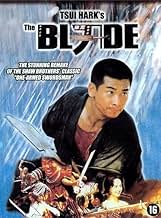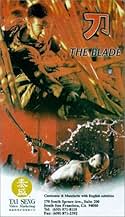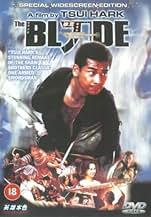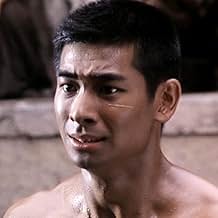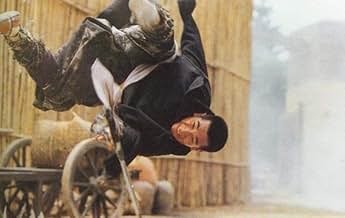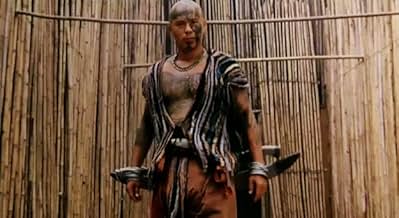IMDb RATING
6.9/10
3.8K
YOUR RATING
A swordsmith trains his friend's orphaned son. The boy seeks revenge for his father's murder but loses an arm rescuing the swordsmith's daughter. A hermit girl nurses him, and he learns swor... Read allA swordsmith trains his friend's orphaned son. The boy seeks revenge for his father's murder but loses an arm rescuing the swordsmith's daughter. A hermit girl nurses him, and he learns swordsmanship with his father's broken sword.A swordsmith trains his friend's orphaned son. The boy seeks revenge for his father's murder but loses an arm rescuing the swordsmith's daughter. A hermit girl nurses him, and he learns swordsmanship with his father's broken sword.
- Awards
- 1 win & 2 nominations total
Xiong Xinxin
- Fei Lung
- (as Xin Xin Xiong)
Collin Chou
- Fast Sabre (Guest star)
- (as Sing Ngai)
- Director
- Writers
- All cast & crew
- Production, box office & more at IMDbPro
Featured reviews
The great thing about this film (and the sort of thing that upsets people who like seeing martial arts fights where you can see every kick and every punch) is that most of the fighting is just blurs of motion punctuated by shouting and clashing blades. This is what I love in HK fantasies: fight scenes that are so incomprehensible you're left going: huh?
Tsui Hark's best example is Zu: Warriors from the Magic Mountain, where the viewer has to actually fill in the blanks for themselves. It's edited in such a way that that the film we see feels like only a portion of the story. In some contexts this technique would be stupid, but in fantasy it's wonderful. It's the inverse of the computer graphics bare-all approach, and it's lucky that we had the HK film industry to provide an alternative to Hollywood in this regard. (I say had, because, since Storm Riders, cg in HK is more prevalent than before.)
This approach to fight scenes is impressionistic, and with the final fightscene in Dao it's almost operatic. At no stage do you get a feeling that the fight is actually rational. The use of sound and music in the film is also wonderful, especially in the menacing flashback scene. It's hard to think of a more effective way of setting up a backstory, and gives new life to that tired old cliche, the revenge story.
So that's all good. Sometimes, however, the impressionism gets a bit out of hand. Things take on a Wong Kar Wai pretentiousness, like the horrible Ashes of time, where Leslie Cheung sits around feeling sorry for himself for no appreciable reason. In Dao, the voiceover of the female character gets really annoying. Her mutterings only really serve to remind us she is there, as she has only one pivotal scene in the film (where tells the hero his origin story).
The film is also a bit over-bloody for my taste, but it certainly leaves one with no illusions about the brutalness of the world in which the film is set.
Dao is one of those films that is so strange and vivid it leaves a strong resonance with the viewer long after it is over. It has faults by the barrel, but I'd rather have it and Tsui Hark with us than a legion of James Camerons and Roland Emmerichs.
Tsui Hark's best example is Zu: Warriors from the Magic Mountain, where the viewer has to actually fill in the blanks for themselves. It's edited in such a way that that the film we see feels like only a portion of the story. In some contexts this technique would be stupid, but in fantasy it's wonderful. It's the inverse of the computer graphics bare-all approach, and it's lucky that we had the HK film industry to provide an alternative to Hollywood in this regard. (I say had, because, since Storm Riders, cg in HK is more prevalent than before.)
This approach to fight scenes is impressionistic, and with the final fightscene in Dao it's almost operatic. At no stage do you get a feeling that the fight is actually rational. The use of sound and music in the film is also wonderful, especially in the menacing flashback scene. It's hard to think of a more effective way of setting up a backstory, and gives new life to that tired old cliche, the revenge story.
So that's all good. Sometimes, however, the impressionism gets a bit out of hand. Things take on a Wong Kar Wai pretentiousness, like the horrible Ashes of time, where Leslie Cheung sits around feeling sorry for himself for no appreciable reason. In Dao, the voiceover of the female character gets really annoying. Her mutterings only really serve to remind us she is there, as she has only one pivotal scene in the film (where tells the hero his origin story).
The film is also a bit over-bloody for my taste, but it certainly leaves one with no illusions about the brutalness of the world in which the film is set.
Dao is one of those films that is so strange and vivid it leaves a strong resonance with the viewer long after it is over. It has faults by the barrel, but I'd rather have it and Tsui Hark with us than a legion of James Camerons and Roland Emmerichs.
This movie was the one of the first true martial artist films I have seen. Since which I have collected a fine library and yet this one still stands out for the story line. A very impressive movie that managed to keep me in rapture during the whole scenario. I would give a big recommendation to any who appreciate martial artist films or just action films to take a look at this one. Even though the movie as I saw it was fairly dark that is easily looked over as the story line pulls you in.
A beautifully filmed story of love and heroism, hate and revenge. The main character leaves in pursuit of his father's murderer, brandishing his broken sword as his weapon. Unfortunately, in his first confrontation with the murderer, a tattooed character that looks like he jumped from the pages of a comic book, our hero is brutally beaten and loses an arm. Forced to live a young boy he trains himself in a one-handed sword technique from a book called The Blade, and sets of in search of revenge again.
It's a shame that a wonderful movie such as THE BLADE received so little coverage/attention from the masses. The only time I have heard about it was from a renounced film critic in HK, and he RAVED about it. And he sure was RIGHT! Tsui Hark did an excellent job here. The atmosphere is good, and the characters are real. As for the action, yes, it's a little too fast, but nonetheless beautifully choreographed.
Apparently, this is quite difficult to see in theatres. I managed to, but it is on video. I imagine that on video, the subtitles are as difficult to read as the ones in "A Chinese Ghost Story" (Another Hark title). Many of the fight scenes are, like the other title, shot on a set in near total darkness with some artificial light as "moonlight". Again, on a screen, beautiful, but on video, a bit hard to see. There is A LOT of fighting, chopped arms legs and heads. (What do you expect, with the action centered around a knife/sword factory?) It's so violent that after a while I found myself laughing to relieve the tension. And the spewing blood can be comical. Like many of these movies, even the "good" guys have questionable motives.
I was interested in this because I'd read that Hark stopped production in the middle because of one of the actress's complaints and rewrote it from a woman's perspective. Still, the main female character is whiny, silly and sheltered, little more than a typical HK plot device to get fights going. I found her character very annoying.
Plot: 4 of 10, fight scenes 8 of 10 IF you can see them on a large screen. Subtitles are lousy, but not really necessary.
I was interested in this because I'd read that Hark stopped production in the middle because of one of the actress's complaints and rewrote it from a woman's perspective. Still, the main female character is whiny, silly and sheltered, little more than a typical HK plot device to get fights going. I found her character very annoying.
Plot: 4 of 10, fight scenes 8 of 10 IF you can see them on a large screen. Subtitles are lousy, but not really necessary.
Did you know
- TriviaOne of Quentin Tarantino's 20 Favourite Movies from 1992 to 2009.
- GoofsThe tattoos on Fei Lung's chest disappear when Ding On throws the blade at his throat in the finale.
- ConnectionsFeatured in Video Buck: TOP 13: Las mejores películas de artes marciales (2017)
- How long is The Blade?Powered by Alexa
Details
Contribute to this page
Suggest an edit or add missing content

